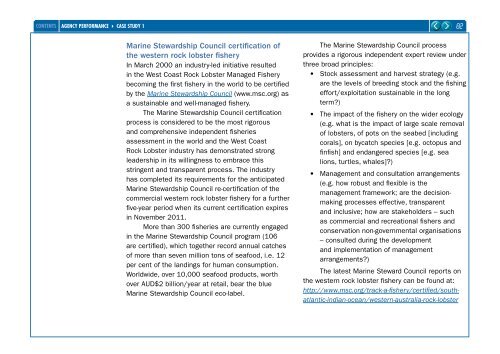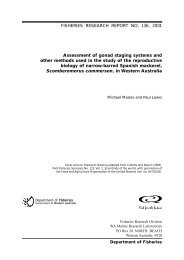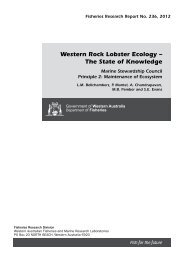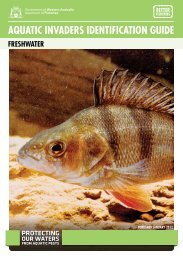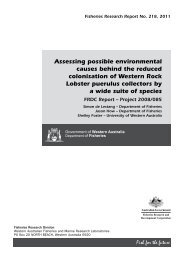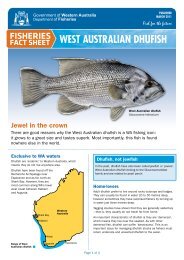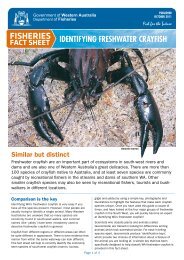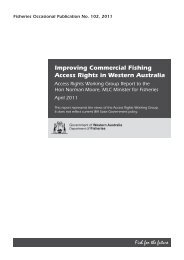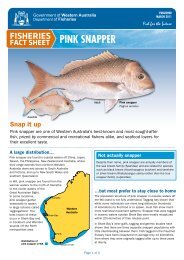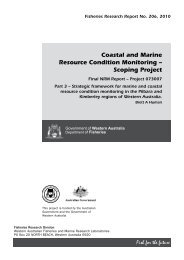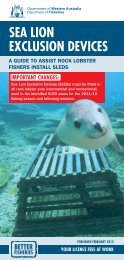DEPARTMENT OF FISHERIES ANNUAL REPORT TO THE ...
DEPARTMENT OF FISHERIES ANNUAL REPORT TO THE ...
DEPARTMENT OF FISHERIES ANNUAL REPORT TO THE ...
Create successful ePaper yourself
Turn your PDF publications into a flip-book with our unique Google optimized e-Paper software.
AgENCy PERFORMANCE � CASE STUDy 1<br />
Marine Stewardship Council certification of<br />
the western rock lobster fishery<br />
In March 2000 an industry-led initiative resulted<br />
in the West Coast Rock Lobster Managed Fishery<br />
becoming the first fishery in the world to be certified<br />
by the Marine Stewardship Council (www.msc.org) as<br />
a sustainable and well-managed fishery.<br />
The Marine Stewardship Council certification<br />
process is considered to be the most rigorous<br />
and comprehensive independent fisheries<br />
assessment in the world and the West Coast<br />
Rock Lobster industry has demonstrated strong<br />
leadership in its willingness to embrace this<br />
stringent and transparent process. The industry<br />
has completed its requirements for the anticipated<br />
Marine Stewardship Council re-certification of the<br />
commercial western rock lobster fishery for a further<br />
five-year period when its current certification expires<br />
in November 2011.<br />
More than 300 fisheries are currently engaged<br />
in the Marine Stewardship Council program (106<br />
are certified), which together record annual catches<br />
of more than seven million tons of seafood, i.e. 12<br />
per cent of the landings for human consumption.<br />
Worldwide, over 10,000 seafood products, worth<br />
over AUD$2 billion/year at retail, bear the blue<br />
Marine Stewardship Council eco-label.<br />
82<br />
The Marine Stewardship Council process<br />
provides a rigorous independent expert review under<br />
three broad principles:<br />
• Stock assessment and harvest strategy (e.g.<br />
are the levels of breeding stock and the fishing<br />
effort/exploitation sustainable in the long<br />
term?)<br />
• The impact of the fishery on the wider ecology<br />
(e.g. what is the impact of large scale removal<br />
of lobsters, of pots on the seabed [including<br />
corals], on bycatch species [e.g. octopus and<br />
finfish] and endangered species [e.g. sea<br />
lions, turtles, whales]?)<br />
• Management and consultation arrangements<br />
(e.g. how robust and flexible is the<br />
management framework; are the decisionmaking<br />
processes effective, transparent<br />
and inclusive; how are stakeholders – such<br />
as commercial and recreational fishers and<br />
conservation non-governmental organisations<br />
– consulted during the development<br />
and implementation of management<br />
arrangements?)<br />
The latest Marine Steward Council reports on<br />
the western rock lobster fishery can be found at:<br />
http://www.msc.org/track-a-fishery/certified/southatlantic-indian-ocean/western-australia-rock-lobster


